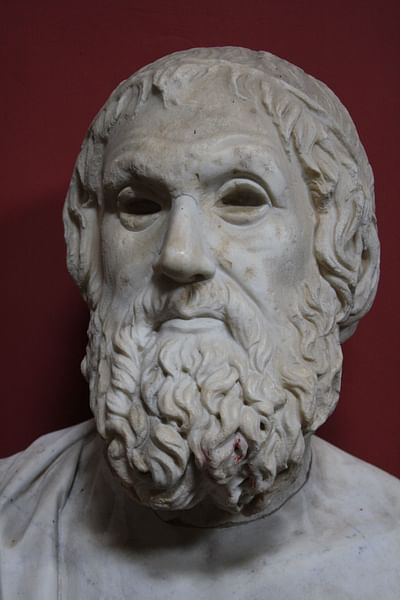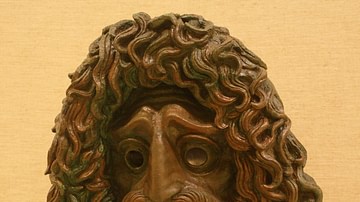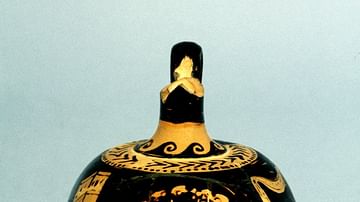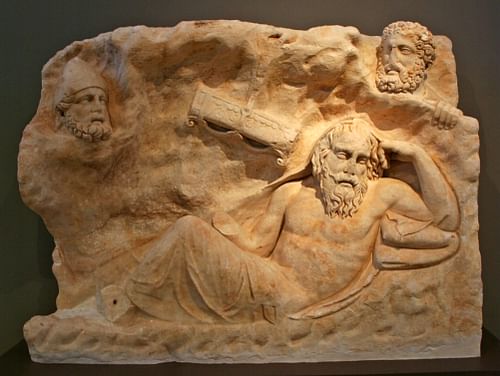
The play Philoctetes was written by one of the greatest of the Greek tragedy playwrights, Sophocles, in 409 BCE. Philoctetes is one of his surviving plays whose exact production date can be determined and is set in the final year of the Trojan War. Initially, as the Greeks were sailing towards Troy, they made a stop at the small island of Lemnos. Having been bitten by a snake, the Greek archer Philoctetes has an incurable wound on his foot. Believing there is little they can do for him, he is abandoned, with few supplies, on the small, isolated island. As the war progresses, the Greeks are told of a prophecy stating they need Philoctetes to win against the Trojans for he has in his possession the bow and arrows of Heracles. They send Odysseus and the son of Achilles, Neoptolemus, to persuade the wounded warrior to help them. Since the old archer despises Odysseus and the sons of Atreus - Greek commanders Menelaus and Agamemnon - for abandoning him, an elaborate scheme is concocted by Odysseus to deceive Philoctetes. Reluctantly, Neoptolemus goes along with it until his conscience tells him otherwise. In the end, Philoctetes is finally convinced to sail to Troy.
Sophocles
Sophocles (c. 496 BCE - c. 406 BCE) was born into a wealthy family in the deme or suburb of Colonus outside the city of Athens. He wrote all of his plays as his beloved city was embroiled in the war against Sparta, the Peloponnesian War. So, besides being a noted tragedian, he was motivated to become extremely active in Athenian political life, serving as a treasurer (hellenotamias) in 443-42 BCE and a general 441-40 BCE. When he was in his eighties, he was named in 412-11 BCE as a member of a group of special magistrates (proboulos) assigned to the unfortunate task of organizing both financial and domestic recovery after the disastrous Greek defeat at Syracuse. He had two sons: Iophon by his wife Nicostrate and Ariston (also called Sophocles) by his mistress Theoris. Both sons would eventually become minor playwrights. Among his closest friends were the historian Herodotus and the statesman Pericles.
Along with Aeschylus and Euripides, Sophocles represents the epitome of Greek tragedy. Unfortunately, aside from a few fragments, only seven of his 120 plays remain in existence. Among his few surviving works is the trilogy of Oedipus the King, Oedipus at Colonus, and Antigone. Although active in the Athenian political arena, his plays rarely contain any references to current events or issues; something that makes the dating of his plays difficult.
In his book Antiquity, historian Norman F. Cantor states that Sophocles' conception of tragedy is “played out within the individual.” (130) This concept of the tragic figure can be seen throughout Philoctetes. The main character has been left alone on a deserted island to survive with not only the agony of a painful, infected foot but also the unbearable anguish associated with loneliness and abandonment. He is resentful of his fellow Greeks, especially Odysseus, who he blames for his plight. When first approached by Neoptolemus, he is skeptical but soon considers the young man a friend. After the deception is revealed, Philoctetes returns to his cave, praying for death. David Raeburn, editor of Sophocles: Electra and Other Plays, calls the play "powerfully compelling" and Philoctetes a heroic figure with consuming bitterness but altogether "intensely human."
Cast of Characters
- Odysseus
- Neoptolemus
- Chorus of Greek sailors
- Philoctetes
- Sailor posing as a merchant
- Heracles
- Attendant sailor
- Soldiers
The Play
The Greek warrior Odysseus and Neoptolemus, the son of the now-deceased Greek hero Achilles, stand outside a cave on the desert island of Lemnos. They have come to the island to take the Greek Philoctetes to Troy. Odysseus confesses to Neoptolemus that it was he who had abandoned Philoctetes on the island nine years earlier, of course, acting upon the orders of his superiors.
The gnawing wound on his foot was oozing with pus. We couldn't pour a libation or offer sacrifice. (203)
The disgusting wound on the foot together with his shouts and yells filled the "camp with an ill omen." Odysseus warns the young Neoptolemus that Philoctetes must not know he is there; it would wreck the plan he has devised to convince the old warrior to sail with them to Troy. They approach the interior of the cave but find no one there, only a mattress of straw. Philoctetes is nowhere to be seen; they assume he is gone searching for food.
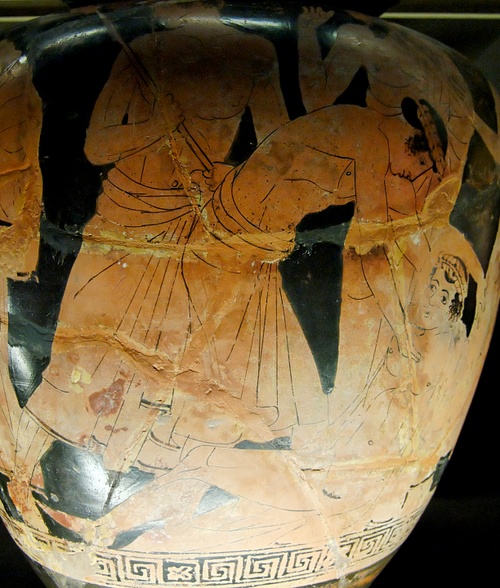
Odysseus' scheme has the young son of Achilles tell the old recluse that he has left Troy and is returning home after a quarrel with the Greek command. He had expected to claim his father's arms but was refused. For the plan to be successful it is vital and that he wins the trust of Philoctetes. In doing so he must then secure the bow and arrow of Heracles (this is essential). Neoptolemus is hesitant, for it is not part of his nature to be deceitful. "I'd rather fail on a noble action than win an ignoble victory." (206) Odysseus understands and says he would have done the same when he was younger but life has taught him that it is "words, not deeds, that shape the course of events" (206). He emphasizes that the young warrior "must use deception to trap Philoctetes." Odysseus tells him that lies are not shameful if they lead to success. To capture Troy they need the bow and arrows in Philoctetes' possession, and it is he, Neoptolemus, who will then sack the city. Doing so will make him a hero. Finally, Neoptolemus agrees and Odysseus exits.
Philoctetes arrives at the cave and speaks to Neoptolemus and a handful of sailors:
Pity a miserable wretch - alone, abandoned, severely injured, without a friend to help. I think you have come as friends. Say something to me. (211)
He is pleased to hear that Neoptolemus is Greek and asks:
What's brought you in to land, my boy, right here? What need or venture? What kind and gracious wind? Explain it all. I must know who you are. (211)
Neoptolemus declares that he is the son of Achilles and is sailing from Troy and returning to Greece. Philoctetes wonders if the young man has heard of him; Neoptolemus confesses that he has not. Philoctetes is saddened.
… the gods must hate me? Not even a rumour about my plight has yet got through to my home or anywhere else in Greece. (212)
Philoctetes reveals his story and how he had been abandoned there, revealing to the curious young man that he wields the bow and arrows of Heracles.
I'm here because the two Greek generals, backed by Odysseus, shamefully flung me ashore alone and abandoned … struck down by the savage bite of a deadly snake. With that for company, son, they marooned be here and left me to rot on my own. (212)
All he has had to sustain him for nine years was pain and distress. Left without even a scrap, he was able to find food only because of the bow and arrows. Fire and shelter supply all of his wants, except for a cure for his ailing foot. He prays that the Olympian gods make them suffer in payment for what they did to him. In agreement with Philoctetes, Neoptolemus explains his feelings concerning the sons of Atreus and Odysseus and reveals that his father Achilles is dead - shot by Apollo. The young man continues explaining how the Greeks had come for him at his home and explains how it was up to him to take the walls of Troy. When he arrived at Troy, he asked for his father's armor but was told it had been given to Odysseus. Neoptolemus was insulted and chose to return home. Philoctetes understands his grief. With that, Neoptolemus turns and says goodbye; he is leaving.
I wish you all of the best. I hope the gods will answer your prayer and grant a cure for you wound. (218)
Philoctetes is shocked and begs to go with him.
Oh, please, my boy! In your father's and mother's name, by all you love and treasure, I humbly implore you, please don't leave me here on my own, abandoned like this, living in all these horrors… (219)
Neoptolemus agrees and prays that the gods will take them safely away from the island. Philoctetes is elated, "The day I dreamed of! Oh, you kind, kind man!" (220)
A 'merchant' - actually a disguised sailor from the ship - arrives at the cave with news from Troy. The Greeks are sending a ship to find Neoptolemus and return to Troy. The merchant further discloses that a second ship with Odysseus on board left to bring Philoctetes to Troy. A prophecy has foretold that the Greeks cannot take Troy without Philoctetes and so Odysseus is on his way to the island to retrieve him. Philoctetes wants to leave immediately before Odysseus arrives. However, before they head for the ship, the old recluse leaves to retrieve some items from the cave: herbs for his foot and several of his arrows. Neoptolemus finally acknowledges the bow is the old man's hand and asks to hold it. Philoctetes agrees:
Yes, I'll allow you to hold this precious bow - and now to give it me back, and proudly boast that because of your goodness you were the only person who ever touched it. I won it myself by kindness. (225)
As they exit the cave, Philoctetes with the pain in his foot increasing hands Neoptolemus the bow:
I'm done for, boy. I can't conceal it from all of you anymore. Oh, oh! It's driving, piercing, gnawing, gnawing, gnawing! ... Look after it and keep it safe until this present seizure of pain subsides. (228-9)
He says the pain will diminish as he sleeps. He warns the young warrior to not let 'them' to take the bow from him. In deep pain, he curses Odysseus who he blames for his plight. He is delirious. He calls for death. Neoptolemus is troubled. He is disgusted with himself and prays to Zeus for guidance. For a short while, the old archer sleeps. Philoctetes tells Neoptolemus that he has a noble nature, true to his father, Achilles. The young Greek warrior is beside himself and he finally tells Philoctetes that he must return to Troy and join the Greeks. Philoctetes realizes he has been betrayed and calls the young man an "all-destroying devil!" Believing the gods have abandoned him, he asks for the return of the bow. If he were to remain on the island, he would die without it.
Suddenly, Odysseus appears. He tells Philoctetes that he must go to Troy with them and, if need be, by force, but the old recluse is reluctant and refuses. Odysseus attempts to convince him to return to Troy saying that the gods say he was born to capture Troy. Still, Philoctetes refuses, cursing Odysseus:
When I contemplate my wretched, tortured existence, mocked by you and the sons of Atreus, the pair of generals whose bidding you are performing now. (239)
He prays for vengeance and believes his life is to be pitied. Finally, Odysseus says the Greeks do not need him and that he, Odysseus, could manage the bow. Philoctetes turns to Neoptolemus, "Will you desert me." (241) Neoptolemus leaves. Alone, the old warrior laments his condition and prays for a sword. When asked by the chorus leader "What violent act are you hoping to do, sir?", he replies "To sever my head" (245).
Neoptolemus and Odysseus return with the bow and arrows. The young son of Achilles must undo the wrong he has done by "guile and deceit." He wants to return the bow, for it was wrong to take it. Odysseus does not, of course, agree and wonders if the young man fears the fight. Neoptolemus draws his sword and vows to fight. Odysseus leaves as Neoptolemus approaches Philoctetes' cave, calling for the old man. He apologizes for what he has done, but Philoctetes is hesitant. "I listened to you before. Your words were splendid, but I suffered for it." (248)
The young man returns the bow and arrows as Odysseus returns, vowing to take Philoctetes by force. Neoptolemus promises that the sore foot can be cured and asks him to put his faith in the gods. Philoctetes says he will not face Agamemnon - his deadliest foe. He asks Neoptolemus to take him back to Greece. Neoptolemus promises to do so. In the final scene, Heracles visits Philoctetes:
You'll go with Neoptolemus to Troy where first your painful wound will be healed. Then chosen for your prowess from the host you'll use my bow and arrows to bring down Paris, the cause of all this bitter strife. (255)
Philoctetes promises to obey Heracles and leaves with Neoptolemus.
Conclusion
Sophocles' Philoctetes is the tragedian's only surviving play without any female actors. The main character Philoctetes had been the subject of earlier plays by Aeschylus and Euripides though Sophocles chose to replace the Greek commander Diomedes with Neoptolemus, the son of the Greek hero Achilles. Philoctetes is seen as a heroic figure, intensely human. He has survived alone for nine years, embittered and resentful with only his wits and the bow of Heracles. At first, he is skeptical of the young Greek Neoptolemus. However, after learning that he is Greek and the son of Achilles, he is full of hope. He regales his plight: the pain he has suffered, not only from his infected foot but also the hatred he holds for Odysseus and the sons of Atreus, Agamemnon and Menelaus.
Neoptolemus speaks of his own personal hatred for the Greek command, having been denied the armor of Achilles. However, the lies he has told the old archer finally eats away at his more compassionate nature. He finally confesses and shows both pity and compassion for the old recluse. Unlike other portrayals, Odysseus is not presented as a hero. Instead, he is a deceiver, believing the end justifies the means. He shows little if any compassion or understanding of the man he marooned nine years earlier. He vows to take Philoctetes by force if necessary. While Philoctetes may come across as a little self-pitying, he is a sad but compelling figure.

